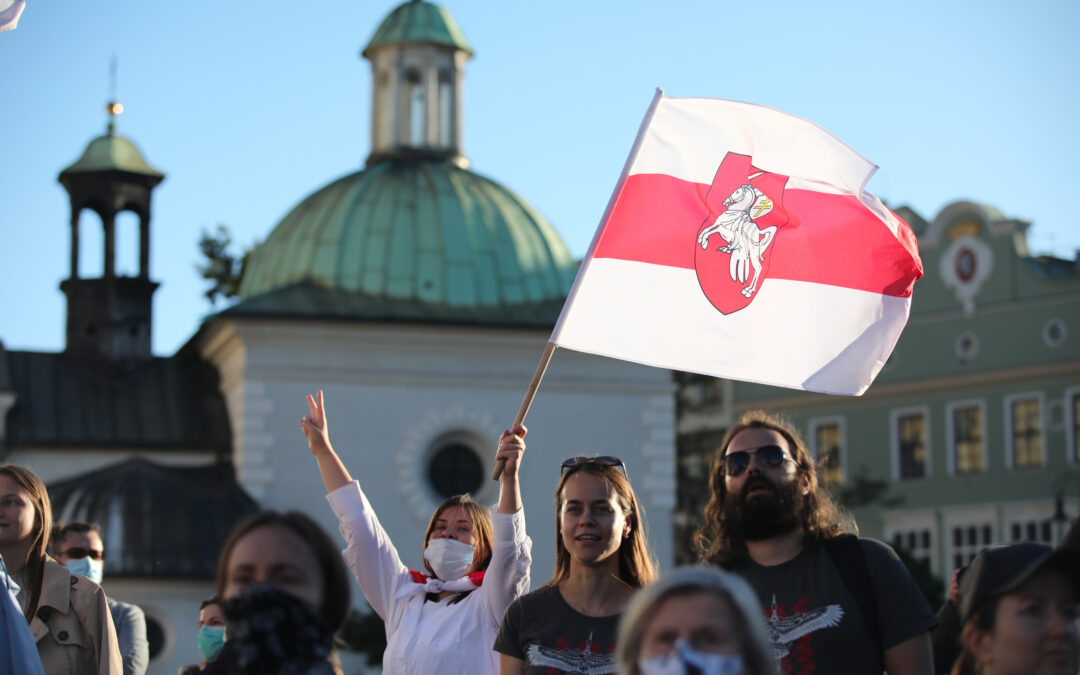Over 700 Belarusians have been given refuge in Poland amid the unrest and repression that has followed August’s presidential election, at which Alexander Lukashenko claimed victory amid widespread evidence of vote rigging.
Poland has during that time given strong backing to the Belarusian democratic opposition, whose exiled leader Sviatlana Tsikhanouskaya today made a second visit to Warsaw to discuss further forms of support.
Between 18 August and 18 October, 707 Belarusians have come to Poland under various forms of protection, deputy interior minister Bartosz Grodecki told the Polish Press Agency (PAP).
Of these, 399 have received humanitarian visas, which are free and allow for an initial one-year stay. Belarusians have been granted these visas through a simplified and expedited procedure.
Another 170 have been confirmed as applicants for international protection in Poland, while a further 74 declared that they have made the application. By comparison, between 2017 and 2019 the average number of applicants from Belarus was only around 40 per year, reports Euractiv.
A further 119 have come with visas for entrepreneurs granted as part of the “Poland. Business Harbour” programme organised by the development ministry and Polish Investment and Trade Agency (PAiH), which aims to help individuals and firms in the ICT sector relocate to Poland.
Finally, 64 Belarusians have been allowed to enter Poland on a case-by-case basis decided by the headquarters of the Border Guard, which is able to make special allowances for people who reach Poland’s borders without the paperwork needed to enter.
Overall, there are currently some 28,200 Belarusians with valid residence permits in Poland, according to Euractiv. Of these, 19,100 have permanent permits due to Polish origin or documents, while 8,300 have only temporary residence.
The true numbers are likely to be much higher, however. A study published in June by Statistics Poland (GUS), a government agency, estimated that, at the end of 2019, there were over 100,000 Belarusians in Poland, making them the country’s second largest immigrant group.
Meanwhile, Tsikhanouskaya, who stood in August’s presidential election against Lukashenko, today made her second visit to Poland since going into exile as the figurehead of the Belarusian opposition.
She once again met with the prime minister, Mateusz Morawiecki, as well as with Krzysztof Szczerski, chief of staff to President Andrzej Duda, to discuss the situation in Belarus and Poland’s “future support” for the country.
The Polish government has called for the EU to create a “Marshall Plan” for Belarus that would provide economic aid if the country pursues a democratic transition. During Tsikhanouskaya’s previous visit, Morawiecki handed her the keys to a building in Warsaw that can serve as a headquarters for the Belarusian opposition.
When the two met again today, Tsikhanouskaya appealed to the Polish prime minister for a change in the law that would allow Belarusians in Poland under humanitarian protection to work.
“We do not want to live here at the expense of others,” she said, quoted by Interia. “We are grateful for the support of the Polish government, but people want to be able to earn a living and benefit the state that has accepted them.”
Spotkałem się z @Tsihanouskaya, niekwestionowaną liderką demokratycznej Białorusi. Rozmawialiśmy o tym, jak @warszawa mogłaby wesprzeć wolnościowe dążenia Białorusinów oraz pomóc tym, którzy z powodu represji zostali zmuszeni do opuszczenia kraju. pic.twitter.com/drhP5hzpVn
— Rafał Trzaskowski (@trzaskowski_) October 20, 2020
During her visit, Tsikhanouskaya also met with Rafał Trzaskowski, the mayor of Warsaw and a leading Polish opposition figure. The pair discussed “the possibility of Polish mayors transferring the experience of local self-government to Belarusian emergent communities”.
The Belarusian opposition leader also spoke at the College of Europe in Natolin, Warsaw, as well as at the opening of a Polish government-sponsored scholarship programme to help Belarusians expelled from universities to study at the University of Warsaw.
The scholarships are part of a “Solidarity with Belarus” plan launched by Poland in August. It allocated 50 million zloty (€11 million) towards expanding victim support programmes, providing easier access to Poland’s jobs market, and helping independent media and NGOs.
“Solidarity is what makes us strong.” – Mrs Sviatlana @Tsihanouskaya speaks about the immense role of women in #Belarus who challenge the reality of oppression in Belarus at the Opening Ceremony 2020 #CoENatolin pic.twitter.com/PJLcDc7Wy1
— College of Europe in Natolin (@coenatolin) October 20, 2020
Poland’s support for the Belarusian opposition has drawn anger from Lukashenko and his allies in the Kremlin. In late August, the Belarusian president accused Warsaw of wanting to grab former Polish territories from his country.
Soon after, Russia’s foreign ministry condemned Poland’s “attempts to interfere in the internal affairs” of Belarus. It “urged Warsaw to return to the universally accepted norms of international law and renounce its policy of undermining the sovereignty of its neighbour”.
Main image credit: Jakub Wlodek / Agencja Gazeta

Maria Wilczek is deputy editor of Notes from Poland. She is a regular writer for The Times, The Economist and Al Jazeera English, and has also featured in Foreign Policy, Politico Europe, The Spectator and Gazeta Wyborcza.




















